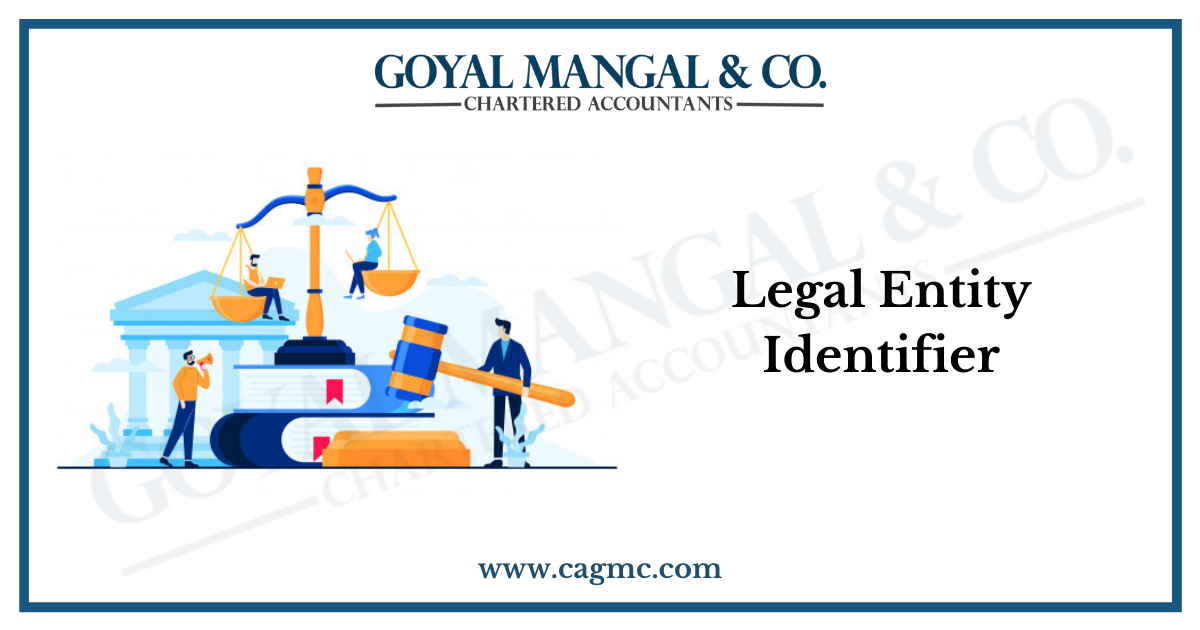| Table of Content |
The Legal Entity Identifier (LEI) initiative is designed to create a global reference data system that uniquely identifies every legal entity, in any jurisdiction, that is party to a financial transaction. More specifically, LEI is a unique 20 digit code that is assigned to a legal entity.

Purpose of LEI (Legal Entity Identifier)
The global LEI system (GLEIS) has been set up by regulatory authorities [including G20 and the Financial Stability Board (FSB)] to address the global financial crisis. The LEI is designed to enable the identification and linking of parties to financial transactions in order to manage counterparty risk. Its goal is to help improve the measuring and monitoring of systemic risk and support more cost-effective compliance with regulatory reporting requirements.
Who needs to apply for LEI codes?
An entity registered in India needs to apply for LEI code from time to time. The list of entities eligible to apply for LEI codes are Sole Proprietorships, Limited Liability Partnerships, Partnership Firms, Trusts, Private Limited Companies, Public Limited Companies, Government Companies, One Person Company, Insurance Companies, Housing Finance Companies, Non-Banking Finance Companies, Nonprofit companies, Special Purpose Vehicles – Trusts, Special Purpose Vehicles – Companies, SPV – Partnership Firms, SPV – Co-operative Societies or Multistate Co-operative Societies Mutual Fund, Mutual Funds-Sub Scheme, Pension Fund, pension Fund Sub-Scheme, Alternative Investment Fund (AIF), AIF- Sub Scheme, Nationalized Banks, Scheduled Urban Cooperative Bank, RRBs, Payment Banks, Banking Companies – Others, Stand Alone Primary Dealers, Public Financial Institutions, Unlimited Companies, Cooperative Societies or Multistate Cooperative Societies, Government Organizations, Companies Limited by Guarantee, Provident /Superannuation /Gratuity / Insurance Fund etc. Other entities as may be specified from time to time.
Initially the Reserve Bank of India came with the notification dated- 01 June, 2017 which has mandated the implementation of the LEI system for all participants in the Over-the-Counter (OTC) markets for Rupee Interest Rate derivatives, foreign currency derivatives and credit derivatives in India, in a phased manner. Entities without an LEI code would not be eligible to participate in the OTC derivative markets, after the date specified in the schedule
| x | Entities | Date by which the LEI code is to be obtained |
| Phase I | Entities regulated by RBI / SEBI / IRDA / PFRDA and Corporates with Net Worth above Rs 10000 mn | August 1, 2017 |
| Phase II | Corporates with Net Worth between Rs 2000 mn and Rs 10000 mn | October 1, 2017 |
| Phase III | Corporates with Net Worth between Rs 700 mn and Rs 2000 mn | December 1, 2017 |
| Phase IV | Corporates with Net Worth of Rs 700 mn and below | March 31, 2018 |
Thereafter, RBI came with a further notification dated- 02 Nov, 2017 which covers participants in non derivative markets and borrowers of banks in a phased manner to apply for LEI, In simple words Introduction of Legal Entity Identifier for large corporate borrowers.
In the above mentioned notification RBI directed that the banks shall advise their existing large corporate borrowers having total exposures of ₹ 50 crore and above to obtain LEI as per the schedule given in the Annex. Borrowers who do not obtain LEI as per the schedule are not to be granted renewal / enhancement of credit facilities. A separate roadmap for borrowers having exposure between ₹ 5 crore and upto ₹ 50 crore would be issued in due course.
Thereafter, RBI with another notification dated- 29 Nov, 2018 comes with the mandatory LEI Code for Participation in Non-Derivative markets, simply to implement the LEI mechanism for all financial market transactions undertaken by non-individuals in interest rate, currency or credit markets regulated by RBI.
Non-derivative markets include Government securities markets, money markets (markets for any instrument with a maturity of one year or less) and non-derivative forex markets (transactions that settle on or before the spot date)


